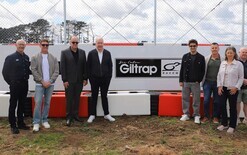Companies brace for ‘negative’ hit from virus

Vehicle safety systems company Autoliv has announced the coronavirus outbreak will likely lead to a “negative effect” on its operations.
While it has not speculated on the extent of such an impact, Autoliv has tapped US$500 million (NZ$832m) from its revolving credit facility to pay down existing short-term debt and for general corporate purposes.
Autoliv says it is monitoring the pandemic and taking measures to minimise any consequences for customers and mitigate the impact on the company.
The business says it will adjust its production accordingly as carmakers shut plants to contain the spread of Covid-19 and in response to declining demand for vehicles. Autoliv warns it may also have to suspend operations at its own plants.
“At this point, it is impossible to predict the overall operational and financial impact this pandemic will have on Autoliv although it will likely to lead to negative effects on our operations,” the company says in a statement.
“Our actions to mitigate the effects of lower business activity include expanding our existing structural efficiency program, balancing our labour force and the sourcing of direct materials, reducing discretionary spending and securing funding availability to support our business activities.
“Since early February, Autoliv has been taking actions at the group and local levels to mitigate the impacts of the COVID-19 outbreak. We have been able to secure a well-functioning supply chain so far, and our operations in China have gradually recovered over the past few weeks, and is well tuned to customer demand as it gradually recovers.”
Mikael Bratt, pictured above, president and chief executive, says he feels confident Autoliv has the “experience, organisation and people to navigate through this challenging situation”.
“Our task force for different workstreams, that initially was set up in January to manage the Covid-19 outbreak in China and later in South Korea and Japan, is now managing the situation on a global level, which has allowed us to act promptly as the situation continues to develop,” he explains.
Geely fearful for year ahead
China’s Geely is tipping 2020 to be “amongst the most difficult years” in its history, as pressure from the pandemic on production and sales looks likely to persist.
The carmaker says lower sales drove net profit down 35 per cent to 8.19 billion yuan (NZ$1.9b) in 2019, when the country’s overall vehicle industry suffered a prolonged slump.
“The recent outbreak of novel coronavirus had caused serious disruption to our supply chain and thus our production levels, meaning additional pressure on our business volume and profitability in 2020,” Geely says in a filing to the Hong Kong exchange.
Jobs under threat
About 100,000 automotive jobs in Germany may soon be scrapped due to the coronavirus and its impact on the industry, according to a market expert.
Ferdinand Dudenhoffer warns production capacity in the country may be too large at a time of falling demand, potentially resulting in an overcapacity of 1.3 million vehicles.
Car production in Germany is tipped to fall to 3.8 million vehicles this year compared to the 5.1m vehicles made in 2019, which in turn may threaten a large chunk of the nation’s 830,000 automotive jobs.
“A good 100,000 jobs could be at risk – 12 per cent of today’s jobs at car manufacturers and suppliers”, Dudenhoffer tells Welt.
He is calling on the German government to stimulate demand for new cars, especially electric and hybrid vehicles.
Production disruption
Toyota is extending the suspension of manufacturing at all its factories in Europe, except for Russia, until further notice.
Work at the plants in France, Britain, the Czech Republic, Poland, Turkey and Portugal is not expected to resume before April 20.
The marque’s Russian factory was set to be closed from March 30 to April 3, and it has already halted production across North America.
Meanwhile, French carmaker Renault says work at all its plants, apart from those in China and South Korea, is on hold due to the impact of the pandemic.
The group said on March 30 it hopes to restart manufacturing at its sites “as soon as conditions permit”.





